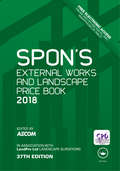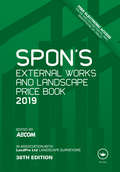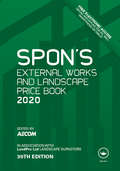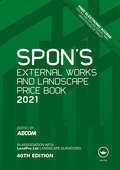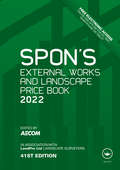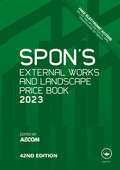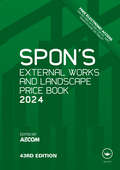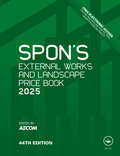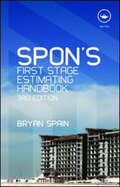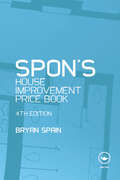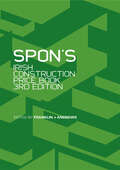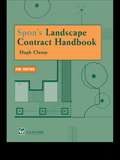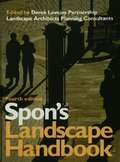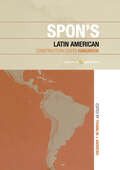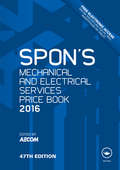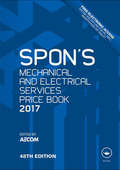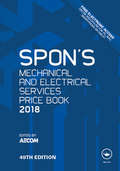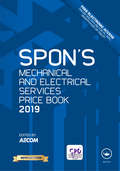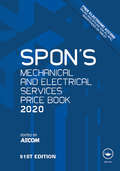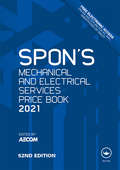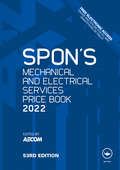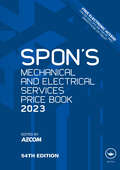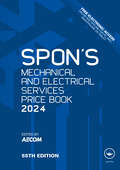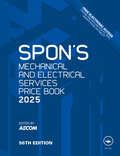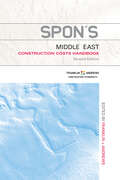- Table View
- List View
Spon's External Works and Landscape Price Book 2018 (Spon's Price Books)
by AecomThis year the rates in the book include contractor’s overheads and profit, making the book easier for design and planning professionals. Now in its 37th edition, Spon's External Works and Landscape Price Book 2018 offers the only comprehensive source of information for detailed external works and landscape costs. It covers all the items to be found in hard and soft landscape contracts, and forms an indispensable reference book for quantity surveyors, landscape architects, contractors and local authority managers – essential for compiling estimates, specifications, bills of quantities and works schedules – no matter what the size of the project being undertaken. Use the access code inside the front cover of the book to get set up with a VitalSource® ebook of this 2018 edition. This versatile and powerful online data viewing package is available for use until the end of December 2018. This NRM edition includes the following new items: BEGA external lighting Build-ups for Wienerberger Dutch paving bricks SUDS paving Alternative french drainage systems Pop-up power Porcelain paving Portland stone paving Portland stone walls and cladding And new Cost Models for commercial housing and civic environments. All the standard features that you expect from SPON'S EXTERNAL WORKS AND LANDSCAPE PRICE BOOK remain: material and measured work prices covering contract items from preliminaries and site clearance and encompassing the core external works activities with full breakdowns into labour, materials and other components detailed guidance on wage rates, landscape consultants’ fee scales an extensive Approximate Estimates section for rapid spot estimating updates, free of charge, two or three times a year – see inside for registration details. Updates are available online at www.pricebooks.co.uk
Spon's External Works and Landscape Price Book 2019 (Spon's Price Books)
by AecomNow in its 38th edition, Spon's External Works and Landscape Price Book 2019 offers the only comprehensive source of information for detailed external works and landscape costs. It covers all the items to be found in hard and soft landscape contracts, and forms an indispensable reference book for quantity surveyors, landscape architects, contractors and local authority managers – essential for compiling estimates, specifications, bills of quantities and works schedules – no matter what the size of the project being undertaken. Use the access code inside the front cover of the book to get set up with an ebook of this 2019 edition on the VitalSource® Bookshelf platform. This versatile and powerful online data viewing package is available for use until the end of December 2019. This NRM edition includes the following new items: Corten edgings Glass balustrades Decking pedestals for roof gardens Stone copings Tier system cladding. All the standard features that you expect from SPON'S EXTERNAL WORKS AND LANDSCAPE PRICE BOOK remain: material and measured work prices covering contract items from preliminaries and site clearance and encompassing the core external works activities with full breakdowns into labour, materials and other components detailed guidance on wage rates, landscape consultants’ fee scales an extensive Approximate Estimates section for rapid spot estimating updates, free of charge, two or three times a year – see inside for registration details. Updates are available online at www.pricebooks.co.uk.
Spon's External Works and Landscape Price Book 2020 (Spon's Price Books)
by AecomNow in its 39th edition, Spon's External Works and Landscape Price Book 2020 offers the only comprehensive source of information for detailed external works and landscape costs. It covers all the items to be found in hard and soft landscape contracts, and forms an indispensable reference book for quantity surveyors, landscape architects, contractors and local authority managers – essential for compiling estimates, specifications, bills of quantities and works schedules – no matter what the size of the project being undertaken. Use the access code inside the front cover of the book to get set up with an ebook of this 2020 edition on the VitalSource® Bookshelf platform, available for access and use until the end of December 2020. This NRM edition provides a detailed breakdown of preliminaries in a series of cost models for different projects It also Includes several new items: Recycled versions of a number of landscape materials and systems – especially retaining walls, fencing and barriers, ground protection grids, and street furniture; New equipment for playgrounds Aggregates Haddonstone balustrades, and New flag and block product ranges of Marshalls paving, especially permeable formats All the standard features that you expect from SPON'S EXTERNAL WORKS AND LANDSCAPE PRICE BOOK remain: - material and measured work prices covering contract items from preliminaries and site clearance and encompassing the core external works activities with full breakdowns into labour, materials and other components - detailed guidance on wage rates, landscape consultants’ fee scales - an extensive Approximate Estimates section for rapid spot estimating - updates, free of charge, twice a year – see inside for registration details. Updates are available online at www.pricebooks.co.uk
Spon's External Works and Landscape Price Book 2021 (Spon's Price Books)
by AecomNow in its 40th edition, Spon's External Works and Landscape Price Book 2021 offers the only comprehensive source of information for detailed external works and landscape costs. It covers all the items to be found in hard and soft landscape contracts, and forms an indispensable reference book for quantity surveyors, landscape architects, contractors and local authority managers – essential for compiling estimates, specifications, bills of quantities and works schedules – no matter what the size of the project being undertaken. Use the access code inside the front cover of the book to get set up with an ebook of this 2021 edition on the VitalSource® Bookshelf platform, available for access and use until the end of December 2021. This NRM edition provides a revised and updated street furniture section. It also includes several new items: Kinley systems – Metal edgings and systems for landscapes and podiums New cost evaluations of water features Stainless steel landscape channel drainage All the standard features that you expect from SPON'S EXTERNAL WORKS AND LANDSCAPE PRICE BOOK remain: • material and measured work prices covering contract items from preliminaries and site clearance and encompassing the core external works activities with full breakdowns into labour, materials and other components • detailed guidance on wage rates, landscape consultants’ fee scales • an extensive Approximate Estimates section for rapid spot estimating • updates, free of charge, twice a year – see inside for registration details. Updates are available online at www.pricebooks.co.uk
Spon's External Works and Landscape Price Book 2022 (Spon's Price Books)
by AecomNow in its 41st edition, Spon's External Works and Landscape Price Book 2022 offers the only comprehensive source of information for detailed external works and landscape costs. It covers all the items to be found in hard and soft landscape contracts, and forms an indispensable reference book for quantity surveyors, landscape architects, contractors and local authority managers – essential for compiling estimates, specifications, bills of quantities and works schedules – no matter what the size of the project being undertaken. The 2022 edition includes new stainless-steel products including: ventilation grilles; handrails; LED handrails; in ground power units; stainless steel bollards; stainless steel warning strips and studs and access covers. Also, an extended range of inspection chambers, new podium specialist soils and a new formwork system, as well as two new Cost Models, one for podiums and another for landscape maintenance. All the standard features that you expect from SPON'S EXTERNAL WORKS AND LANDSCAPE PRICE BOOK remain: • material and measured work prices covering contract items from preliminaries and site clearance and encompassing the core external works activities with full breakdowns into labour, materials and other components • detailed guidance on wage rates, landscape consultants’ fee scales • an extensive Approximate Estimates section for rapid spot estimating • updates, free of charge, twice a year – see inside for registration details. Updates are available online at www.pricebooks.co.uk Use the access code inside the front cover of the book to get set up with an ebook of this 2022 edition on the VitalSource® Bookshelf platform, available for access and use until the end of December 2022.
Spon's External Works and Landscape Price Book 2023 (Spon's Price Books)
by AecomNow in its 42nd edition, Spon's External Works and Landscape Price Book 2023 offers the only comprehensive source of information for detailed external works and landscape costs. It covers all the items to be found in hard and soft landscape contracts, and forms an indispensable reference book for quantity surveyors, landscape architects, contractors and local authority managers – essential for compiling estimates, specifications, bills of quantities and works schedules – no matter what the size of the project being undertaken. The 2023 edition includes: updated key resources to obtain the latest market pricing and align with the latest supply material specifications and/or quantities guidance on land remediation, tax relief, capital allowances and aggregates levies revised rates in line with the latest market forecasts and indices, which include the impacts of Brexit, the pandemic, Ukraine supply chain disruption and the energy crisis All the standard features that you expect from SPON'S EXTERNAL WORKS AND LANDSCAPE PRICE BOOK remain: • material and measured work prices covering contract items from preliminaries and site clearance and encompassing the core external works activities with full breakdowns into labour, materials and other components • detailed guidance on wage rates, landscape consultants’ fee scales • an extensive Approximate Estimates section for rapid spot estimating • updates, free of charge, twice a year – see inside for registration details. Updates are available online at www.pricebooks.co.uk Use the access code inside the front cover of the book to get set up with an ebook of this 2023 edition on the VitalSource® Bookshelf platform, available for access and use until the end of December 2023.
Spon's External Works and Landscape Price Book 2024 (Spon's Price Books)
Compiled by AECOM, the 2024 edition has been updated with the latest pricing information to help you manage your projects over the next 12 months through this challenging period of high inflation and financial uncertainty. It covers all the items to be found in hard and soft landscape contracts, and forms an indispensable reference book for quantity surveyors, landscape architects, contractors and local authority managers – essential for compiling estimates, specifications, bills of quantities and works schedules – no matter what the size of the project being undertaken. All prices have been updated via a short-term inflationary forecast combined with AECOM’s market intelligence to ensure you have the most accurate cost data available. Activity descriptions and build ups have been updated to reflect changes to standard specifications, Building Regulation changes, emerging practices, and changing outputs All the standard features you have come to expect from SPON'S are also included: Material and measured work prices covering contract items from preliminaries and site clearance and encompassing the core external works activities Full breakdowns into labour, materials and other components Detailed guidance on wage rates, landscape consultants’ fee scales An extensive Approximate Estimates section for rapid spot estimating Included within the inside front cover of every book is a VitalSource eBook redemption code giving one user access to the content digitally until the end of December 2024.
Spon's External Works and Landscape Price Book 2025 (Spon's Price Books)
Now in its 44th edition, Spon's External Works and Landscape Price Book 2025 offers the only comprehensive source of information for detailed external works and landscape costs. It covers all the items to be found in hard and soft landscape contracts, and forms an indispensable reference book for quantity surveyors, landscape architects, contractors and local authority managers – essential for compiling estimates, specifications, bills of quantities and works schedules – no matter what the size of the project being undertaken.All the standard features that you expect from SPON'S EXTERNAL WORKS AND LANDSCAPE PRICE BOOK remain:• material and measured work prices covering contract items from preliminaries and site clearance and encompassing the core external works activities with full breakdowns into labour, materials and other components• detailed guidance on wage rates, landscape consultants’ fee scales• an extensive Approximate Estimates section for rapid spot estimatingUse the access code inside the front cover of the book to get set up with an ebook of this edition on the VitalSource® Bookshelf platform, available for access and use until the end of December 2025.
Spon's First Stage Estimating Handbook (Spon's Estimating Costs Guides)
by Bryan SpainHave you ever had to provide accurate costs for a new supermarket or a pub "just an idea...a ballpark figure..." ?The earlier a pricing decision has to be made, the more difficult it is to estimate the cost and the more likely the design and the specs are to change. And yet a rough-and-ready estimate is more likely to get set in stone.Spon's First
Spon's House Improvement Price Book (Spon's Price Books)
by Bryan SpainCompiled especially for small and medium contractors and for all those involved in building traditional extensions or converting lofts, Spon's House Improvement Price Book provides detailed and reliable cost data. Fully-priced out standard items cover 44 house extensions of different types and sizes, plus three loft conversions. In addition there are chapters on the pricing of common alterations, repair of damage due to floods, fire and gales, and on plant and tool hire.
Spon's Irish Construction Price Book (Spon's International Price Books)
by Franklin AndrewsThis new edition of Spon's Irish Construction Price Book, edited by Franklin + Andrews, is the only complete, tailored and up-to-date source of cost data for the Irish construction industry. This price book is an essential aid to profitable contracting for all those operating in Ireland's buoyant construction industry.All the materials costs,
Spon's Landscape Contract Handbook: A guide to good practice and procedures in the management of lump sum landscape contracts
by Hugh Clamp H. ClampThis indispensable manual for landscape work covers the documentation and management of landscape contracts. It is written for all those involved in the landscape industry.
Spon's Landscape Handbook
by Derek Lovejoy PartnershipThere have been such great changes in legislation, official guidance, the British Standards and the techniques used in landscape and external works since the third edition was written ten years ago that the Handbook has been totally rewritten for this edition.This new edition of the Handbook provides a guide to planning and landscape law, a review of computer-aided design techniques for landscape designers, together with guidance on data to be collected during first site visits. The opportunity has been taken to change the format of the work sections to comply with SMM7 to make it easier to find specific items and to read in conjunction with the current edition of Spon's Landscape and External Works Price Book. The SMM7 sections are now divided into four parts - General Guidance, British Standards, Data and Outline Specification. Diagrams, typical drawings and photographs illustrate each section. The useful bibliography has been updated and revised.
Spon's Latin American Construction Costs Handbook (Spon's International Price Books)
by Franklin + AndrewsThis unique publication is the only detailed, multinational guide to the cost of construction work across Latin America. Countries covered are Argentina, Brazil, Chile, Colombia, Ecuador, French Guiana, Guyana, Mexico, Paraguay, Peru, Suriname, Uruguay and Venezuela.
Spon's Mechanical and Electrical Services Price Book 2016 (Spon's Price Books)
by AecomAn essential reference for everybody concerned with the calculation of costs of mechanical and electrical works. Cost Engineer The construction sector is improving. Will skills shortages derail the upturn? Spon's Mechanical and Electrical Services Price Book 2016
Spon's Mechanical and Electrical Services Price Book 2017 (Spon's Price Books)
by Aecom‘An essential reference for everybody concerned with the calculation of costs of mechanical and electrical works.’ – Cost Engineer …riding with the UK construction industry. Spon's Mechanical and Electrical Services Price Book 2017 continues to be the most comprehensive and best annual services engineering price book currently available, providing detailed pricing information across the full range of mechanical and electrical services, together with higher-level costs for a diverse range of systems and different building applications. Use the access code inside the front cover of the book to get set up with internet access to this 2017 edition until the end of December 2017. We now provide a VitalSource® ebook, giving a versatile and powerful online data viewing package. Using a combination of NRM1 and NRM2 as the measurement standards, this edition includes the following new and significantly developed items: WiFi equipment FP 600 cable Wireless fire alarms and a much enhanced clock section All the standard features you have come to expect from SPON'S MECHANICAL AND ELECTRICAL SERVICES PRICE BOOK are also included, considered essential for today’s services cost professional: detailed materials prices, labour constants, labour costs and measured work prices for mechanical and electrical works, from above ground drainage to automatic transfer switches, and circuit breakers to sprinkler systems an extensive Approximate Estimating section for quick, rule-of-thumb pricing of mechanical or electrical installations, together with elemental services costs for different types and standard of buildings full details of wage rates, daywork and cost indices on a national and Central London basis. an overhauled index and guidance notes updated, free of charge, two or three times a year – see inside for registration details. Updates are available online at www.pricebooks.co.uk Other titles in the SPON’S Price Book Series SPON’S ARCHITECTS’ AND BUILDERS’ PRICE BOOK 2017 SPON’S CIVIL ENGINEERING AND HIGHWAY WORKS PRICE BOOK 2017 SPON’S EXTERNAL WORKS AND LANDSCAPE PRICE BOOK 2017 Price Net: £160.00 (UK only)
Spon's Mechanical and Electrical Services Price Book 2018 (Spon's Price Books)
by AecomSpon's Mechanical and Electrical Services Price Book 2018 continues to be the most comprehensive and best annual services engineering price book currently available, providing detailed pricing information across the full range of mechanical and electrical services, together with higher-level costs for a diverse range of systems and different building applications. Use the access code inside the front cover of the book to get set up with a VitalSource® ebook of this 2018 edition. This versatile and powerful online data viewing package is available for use until the end of December 2018. With new cost models for a gym, a spa and a bar, this edition also includes the following new items: Solar thermal panels A physical access control barrier system A security revolving door And significant developments to Calorifiers Commercial Boilers Combined heating and power systems Heat exchangers All the standard features you have come to expect from SPON'S MECHANICAL AND ELECTRICAL SERVICES PRICE BOOK are also included, considered essential for today’s services cost professional: detailed materials prices, labour constants, labour costs and measured work prices for mechanical and electrical works, from above ground drainage to automatic transfer switches, and circuit breakers to sprinkler systems an extensive Approximate Estimating section for quick, rule-of-thumb pricing of mechanical or electrical installations, together with elemental services costs for different types and standard of buildings full details of wage rates, daywork and cost indices on a national and Central London basis. an overhauled index and guidance notes updates, free of charge, two or three times a year – see inside for registration details. Updates are available online at www.pricebooks.co.uk
Spon's Mechanical and Electrical Services Price Book 2019 (Spon's Price Books)
by AecomSpon's Mechanical and Electrical Services Price Book 2019 continues to be the most comprehensive and best annual services engineering price book currently available, providing detailed pricing information across the full range of mechanical and electrical services, together with higher-level costs for a diverse range of systems and different building applications. Use the access code inside the front cover of the book to get set up with an ebook of this 2019 edition on the VitalSource® Bookshelf platform. This versatile and powerful online data viewing package is available for use until the end of December 2019. In this 50th edition we have significantly updated the engineering features section and added a section on smart building technology. Along with the following new and significantly developed items: Tuneable white luminaires Wireless lighting control PV cells Battery storage systems All the standard features you have come to expect from SPON'S MECHANICAL AND ELECTRICAL SERVICES PRICE BOOK are also included, considered essential for today’s services cost professional: detailed materials prices, labour constants, labour costs and measured work prices for mechanical and electrical works, from above ground drainage to automatic transfer switches, and circuit breakers to sprinkler systems an extensive Approximate Estimating section for quick, rule-of-thumb pricing of mechanical or electrical installations, together with elemental services costs for different types and standard of buildings full details of wage rates, daywork and cost indices on a national and Central London basis an overhauled index and guidance notes updates, free of charge, two or three times a year – see inside for registration details. Updates are available online at www.pricebooks.co.uk ~Spon's Mechanical and Electrical Services Price Book 2019 continues to be the most comprehensive and best annual services engineering price book currently available, providing detailed pricing information across the full range of mechanical and electrical services, together with higher-level costs for a diverse range of systems and different building applications. Use the access code inside the front cover of the book to get set up with a VitalSource® ebook of this 2019 edition. This versatile and powerful online data viewing package is available for use until the end of December 2019. In this 50th edition we have significantly updated the engineering features section and added a section on smart building technology. Along with the following new and significantly developed items: - Tuneable white luminaires- Wireless lighting control- PV cells- Battery storage systems All the standard features you have come to expect from SPON'S MECHANICAL AND ELECTRICAL SERVICES PRICE BOOK are also included, considered essential for today’s services cost professional:• detailed materials prices, labour constants, labour costs and measured work prices for mechanical and electrical works, from above ground drainage to automatic transfer switches, and circuit breakers to sprinkler systems• an extensive Approximate Estimating section for quick, rule-of-thumb pricing of mechanical or electrical installations, together with elemental services costs for different types and standard of buildings• full details of wage rates, daywork and cost indices on a national and Central London basis.• an overhauled index and guidance notes• updates, free of charge, two or three times a year – see inside for registration details. Updates are available online at www.pricebooks.co.uk
Spon's Mechanical and Electrical Services Price Book 2020 (Spon's Price Books)
by AecomSpon's Mechanical and Electrical Services Price Book 2020 continues to be the most comprehensive and best annual services engineering price book currently available, providing detailed pricing information across the full range of mechanical and electrical services, together with higher-level costs for a diverse range of systems and different building applications. Use the access code inside the front cover of the book to get set up with an ebook of this 2020 edition on the VitalSource® Bookshelf platform, available for access and use until the end of December 2020. A number of new engineering features have been added: This year the lighting section has been entirely overhauled to accurately represent the latest industry standards in light fittings The three exciting areas of development AECOM has this year identified in the MEP sector -- battery storage systems, exposed services and grid decarbonisation Along with new items including MVHRs, district heating HIUs, and air source heat pumps All the standard features you have come to expect from SPON'S MECHANICAL AND ELECTRICAL SERVICES PRICE BOOK are also included, considered essential for today’s services cost professional: detailed materials prices, labour constants, labour costs and measured work prices for mechanical and electrical works, from above ground drainage to automatic transfer switches, and circuit breakers to sprinkler systems an extensive Approximate Estimating section for quick, rule-of-thumb pricing of mechanical or electrical installations, together with elemental services costs for different types and standard of buildings full details of wage rates, daywork and cost indices on a national and Central London basis. an overhauled index and guidance notes updates, free of charge, twice a year – see inside for registration details. Updates are available online at www.pricebooks.co.uk
Spon's Mechanical and Electrical Services Price Book 2021 (Spon's Price Books)
by AecomThe definitive M&E price book with additions to the measured works, updates to approximate estimating and new engineering features. Spon's Mechanical and Electrical Services Price Book 2021 continues to be the most comprehensive and best annual services engineering price book currently available, providing detailed pricing information across the full range of mechanical and electrical services, together with higher-level costs for a diverse range of systems and different building applications. Use the access code inside the front cover of the book to get set up with an ebook of this 2021 edition on the VitalSource® Bookshelf platform, available for access and use until the end of December 2021. In this year’s book: • An overhaul of the uninterruptible power supply section, and revised costs for air source heat pumps • new items including: – HDPE pipe for above ground drainage systems – fire protection mist systems – electric vehicle chargers • new engineering features: data centre cooling, later living developments, residential heat pumps, large scale heat pumps, and local energy networks • Articles on intelligent buildings to boost productivity efficiency and well being, ways data analytics is transforming BIM, digital delivery and the design process, and coronavirus and the future of work All the standard features you have come to expect from Spon's Mechanical and Electrical Services Price Book are also included, considered essential for today’s services cost professional: • detailed materials prices, labour constants, labour costs and measured work prices for mechanical and electrical works, from above ground drainage to automatic transfer switches, and circuit breakers to sprinkler systems • an extensive Approximate Estimating section for quick, rule-of-thumb pricing of mechanical or electrical installations, together with elemental services costs for different types and standard of buildings • full details of wage rates, daywork and cost indices on a national and Central London basis. • an overhauled index and guidance notes • updates, free of charge, twice a year – see inside for registration details. Updates are available online at www.pricebooks.co.uk
Spon's Mechanical and Electrical Services Price Book 2022 (Spon's Price Books)
by AecomThe definitive M&E price book with additions to the measured works, updates to approximate estimating and new engineering features. Spon's Mechanical and Electrical Services Price Book 2022 continues to be the most comprehensive and best annual services engineering price book currently available, providing detailed pricing information across the full range of mechanical and electrical services, together with higher-level costs for a diverse range of systems and different building applications. Use the access code inside the front cover of the book to get set up with an ebook of this 2022 edition available for access and use until the end of December 2022. All the standard features you have come to expect from SPON'S are also included, considered essential for today’s services cost professional: detailed materials prices, labour constants, labour costs and measured work prices for mechanical and electrical works, from above ground drainage to automatic transfer switches, and circuit breakers to sprinkler systems an extensive Approximate Estimating section for quick, rule-of-thumb pricing of mechanical or electrical installations, together with elemental services costs for different types and standard of buildings full details of wage rates, daywork and cost indices on a national and Central London basis. an overhauled index and guidance notes updates, free of charge, twice a year – see inside for registration details. Updates are available online at www.pricebooks.co.uk
Spon's Mechanical and Electrical Services Price Book 2023 (Spon's Price Books)
by AecomSpon's Mechanical and Electrical Services Price Book 2023 continues to be the most comprehensive and best annual services engineering price book currently available, providing detailed pricing information across the full range of mechanical and electrical services, together with higher-level costs for a diverse range of systems and different building applications. Use the access code inside the front cover of the book to get set up with an ebook of this 2023 edition available for access and use until the end of December 2023. Includes all the standard features you have come to expect from SPON'S are also included, considered essential for today’s services cost professional: • detailed materials prices, labour constants, labour costs and measured work prices for mechanical and electrical works, from above ground drainage to automatic transfer switches, and circuit breakers to sprinkler systems • an extensive Approximate Estimating section for quick, rule-of-thumb pricing of mechanical or electrical installations, together with elemental services costs for different types and standard of buildings • full details of wage rates, daywork and cost indices on a national and Central London basis. • an overhauled index and guidance notes • updates, free of charge, twice a year – see inside for registration details. Updates are available online at www.pricebooks.co.uk
Spon's Mechanical and Electrical Services Price Book 2024 (Spon's Price Books)
Compiled by AECOM, the 2024 edition has been updated with the latest pricing information to help you manage your projects over the next 12 months through this challenging period of high inflation and financial uncertainty. It covers the full range of mechanical and electrical services, together with higher-level costs for a diverse range of systems and different building applications. All prices have been updated via comprehensive supplier engagement combined with AECOM’s market intelligence and a short-term inflationary forecast to ensure you have the most accurate cost data available. Activity descriptions and build ups have been updated to reflect changes to standard specifications, Building Regulation changes, emerging practices, and changing outputs All the standard features you have come to expect from SPON'S are also included, considered essential for today’s services cost professional: detailed materials prices, labour constants, labour costs and measured work prices for mechanical and electrical works, from above ground drainage to automatic transfer switches, and circuit breakers to sprinkler systems an extensive Approximate Estimating section for quick, rule-of-thumb pricing of mechanical or electrical installations, together with elemental services costs for different types and standard of buildings full details of wage rates, daywork and cost indices on a national and Central London basis an updated index and guidance notes Included within the inside front cover of every book is a VitalSource® eBook redemption code giving one user access to the content digitally until the end of December 2024.
Spon's Mechanical and Electrical Services Price Book 2025 (Spon's Price Books)
Compiled by AECOM, the 2025 edition has been updated with the latest pricing information to help you manage your projects over the next 12 months through this challenging period of high inflation and financial uncertainty.It covers the full range of mechanical and electrical services, together with higher-level costs for a diverse range of systems and different building applications. All prices have been updated via comprehensive supplier engagement combined with AECOM’s market intelligence and a short-term inflationary forecast to ensure you have the most accurate cost data available. Activity descriptions and build ups have been updated to reflect changes to standard specifications, Building Regulation changes, emerging practices, and changing outputs.All the standard features you have come to expect from SPON'S MECHANICAL AND ELECTRICAL SERVICES PRICE BOOK are also included, considered essential for today’s services cost professional: detailed materials prices, labour constants, labour costs, and measured work prices for mechanical and electrical works, from above ground drainage to automatic transfer switches, and circuit breakers to sprinkler systems an extensive Approximate Estimating section for quick, rule-of-thumb pricing of mechanical or electrical installations, together with elemental services costs for different types and standard of buildings full details of wage rates, daywork and cost indices on a national and Central London basis an updated index and guidance notes Included within the inside front cover of every book is a VitalSource® eBook redemption code giving one user access to the content digitally until the end of December 2025.
Spon's Middle East Construction Costs Handbook (Spon's International Price Books)
by FranklinThe indispensable guide to building costs in Bahrain, Egypt, Iran, Iraq, Jordan, Kuwait, Lebanon, Libya, Oman, Qatar, Saudi Arabia, Syria and the UAE. Features detailed information across all sectors and by individual country, plus comparative information.
